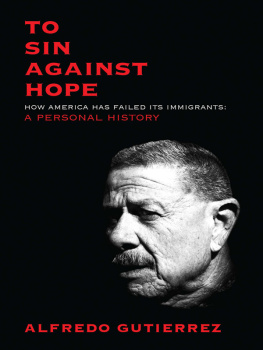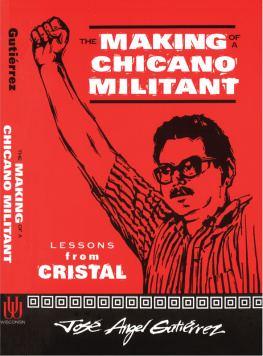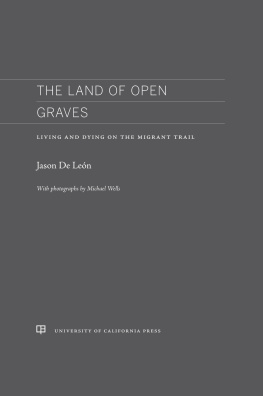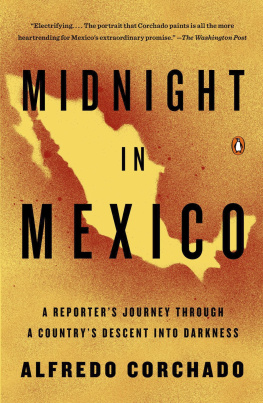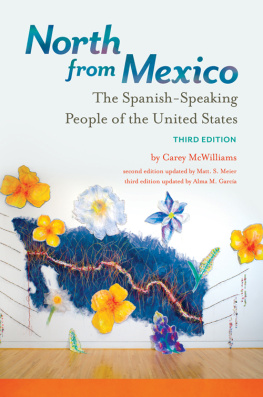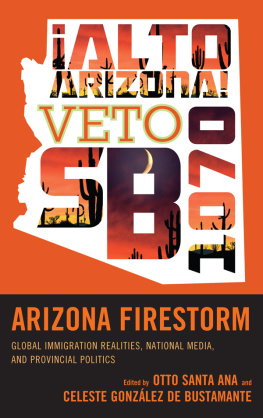To Sin Against Hope
Life and Politics on the Borderland
BY
ALFREDO GUTIERREZ

To Roses daughter Marisol and to my sons, Samuel, Luis, Ben and David that they may understand the journey that brought us here.
First published by Verso 2013
Alfredo Gutierrez 2013
All rights reserved
The moral rights of the author have been asserted
Verso
UK: 6 Meard Street, London W1F 0EG
US: 20 Jay Street, Suite 1010, Brooklyn, NY 11201
www.versobooks.com
Verso is the imprint of New Left Books
ISBN: 978-1-844-67993-5 (e-book)
British Library Cataloguing in Publication Data
A catalogue record for this book is available from the British Library
Library of Congress Cataloging-in-Publication Data
Gutierrez, Alfredo, 1945
To sin against hope : life and politics on the borderland / by Alfredo Gutierrez.
pages cm
Includes bibliographical references.
ISBN 978-1-84467-992-8 (alkaline paper)
1. Gutierrez, Alfredo, 1945- 2. Political activistsArizonaBiography. 3. Mexican AmericansArizonaBiography. 4. Mexican AmericansCivil rightsArizona. 5. Civil rights movementsArizona. 6. ImmigrantsCivil rightsArizona. 7. LegislatorsArizonaBiography. 8. Arizona. Legislature. SenateBiography. 9. ArizonaPolitics and government1951- 10. Mexican-American Border RegionPolitics and government. I. Title.
F815.3.G88A3 2013
328.73092dc23
[B]
2013007252
Typeset in Sabon by Hewer Text UK Ltd, Edinburgh
Printed in the US by Maple Vail
Contents
I was born in Miami, Arizona, on Depot Hill, which rises dramatically from the rails edge next to the passenger depot. Miami was also the town where my father was bornand from where he was deported. One day in 1932, he boarded a train into exile in Mexico, and it was a dozen years before he returned.
The Miami, Arizona, where I grew up in the 1950s was booming. Three major mines were operating twenty-four hours a day, with hundreds of workers lined up at the gates for every shift. At the end of every shift they stormed out, covered with grime and dust, and headed into a town full of bars, churches and thriving family-owned stores that met every conceivable need. There were whorehouses: three big ones in the 1950s. The biggest of all had a gambling hall full of poker tables, the towns longest bar, and on weekends a barroom full of drunken cowboys and miners. I was a shoeshine boy, and I soon learned that whorehouses, especially the Pioneer, were the best places to wait for someone to claim a jackpot or stroll down the stairs, smile and all, having just visited the ladies. These guys were ready for a shine and ready to tip.
My other job was delivering the newspaper each morning. My route was the one with canyons, winding dirt trails, concrete staircases built by miners at the turn of the century that went a thousand steps up sheer hillsides, and Mexican families grateful that the old man was working underground so they could afford the paper. Every morning I visited houses that sat precariously on lots carved into the canyons, and every weekend I knocked on each door to collect. It was on those Saturday mornings that I came to understand what it really cost to work those mines. There were families smiling, stomachs full and ready to head out to the company store but perhaps two houses down the canyon your friend would whisper that it might be best if you came back later. Kids would gather at the bottom of the hill to recount the events, of fathers staggering home at daybreak, mothers in tears, a young guy threatening to kill his father if the old man hit her again.
And you knew when the work was running thin, or when it was time to pay for the daughters wedding or the kids new shoes or the new roomfamilies were always growing in mining towns. You knew because when times were tough, who needed an anti-union, right-wing newspaper that barely noticed the world of the miners?
My fathers deportation story was not particularly unusual in Arizonas mining towns at that time. It was just part of the landscape, one of the sacrifices Mexicans risked in order to work in the mines, join the union, get steady pay and a company doctor, raise the kids, maybe send them to college and get them out from underground. My father was deported in 1932. It was at the height of anti-immigrant hysteria that had been growing for two decades. Madison Grants highly influential book, The Passing of the Great Race, had been published in 1916. Grant described the United States as the highest accomplishment of the Nordic race of northern and western Europe, a place where Democracy flourished because it had been founded by this Nordic white race. The greatest danger America faced was the immigration of non-Nordic people. They would pollute the purity of America and debase the values, morals, and intelligence of the American people. Mexicans fit Grants definition of a population of race bastards as an example of a people whose inferior Indian blood would dominate whatever good white blood there may have been in a mestizo.1 The mestizo, in his view, was a moral cripple incapable of democratic government.
Grant was perhaps the best known and most often cited scientific racist of the era, a leader of the eugenics movement in America. A powerful voice advocating for the passage of the restrictive anti-immigration Quota Law of 1924, he argued successfully in a majority of the states for coercive sterilization laws and worked with Marcus Garvey to facilitate the return of former slaves to Africa. Grants public persona was not defined by simple racism. He was a friend of Teddy Roosevelt, is often credited as a founder of the American conservation movement, helped create Denali and Glacier National Parks, and counted among his friends President William Taft, John D. Rockefeller, and Andrew Carnegie. Even Adolf Hitler recognized his genius, calling The Passing of the Great Race my bible.2
But Grants was not the only voice calling for extreme measures against dark-skinned immigrants. C. M. Goethe, later the august founder of Sacramento State College, estimated that the average American Family had three children while the Mexican family had nine or ten offspring. At this rate the former couple had 27 great-grandchildren while the latter had 729. Within a few generations Mexicans would control the United States through sheer weight of numbers. The danger of being inundated by Mexican bad blood was imminent and profoundly alarming. Roy Garis, an expert in eugenics and a professor of economics at Vanderbilt University, wrote of Mexicans:
Their minds run to nothing higher than animal functionseat, sleep, and sexual debauchery. In every huddle of Mexican shacks one meets the same idleness, hordes of hungry dogs, and filthy children with faces plastered with flies, disease, lice, human filth, stench, promiscuous fornication, bastardy These people sleep by day and prowl by night like coyotes, stealing anything they can get their hands on, no matter how useless to them it may be Yet there are Americans clamoring for more of this human swine to be brought over from Mexico.3
The Chinese Exclusion Act of 1882 and later legislation had closed the door to Asians, and the Literacy Act of 1917 had been passed to try to exclude illiterate peasants, but waves of Jews, Poles, Italians, Irish, and Greeks continued landing on Americas shores. In 1921 and again in 1924 Congress passed Quota Laws that established a maximum number of immigrants by national origin. The quotas were based upon the demographic makeup of the United States in 1890prior to the great waves from southern Europe. The intent was obvious: America had been founded as a white Nordic country, and Congress intended to keep it that way.
Next page
